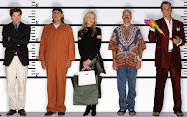I have recently begun reading Jonathan Haidt's The Happy Hypothesis -- which I am finding to be quite engaging -- and I went online to discover this website YourMorals.org. After registering my name, I began to take a few psychology surveys, the first of which happened to relate to Haidt's Ted talk on conservative and liberal morals. (According to the study, liberals tend to value justice and have a higher openness to experience, whereas conservative value loyalty.) Here, Haidt opens with the following anecdote:
Suppose that two American friends are traveling together in Italy, and when they come face to face with Michelangelo's David, they both freeze dead in their tracks. The first guy -- let's call him Adam -- is transfixed by the beauty of the human form. The second guy -- we'll call him Bill -- is transfixed by embarrassment at staring at the thing in the middle. My question is, which of these men voted for George Bush and which voted for Al Gore?Interestingly, Haidt makes the connection that most Tedsters are liberal, and this becomes a problem because all of these individual thinkers actually become a team working towards the same goal. We need to have diversity. And in speaking to this liberal audience, he consciously points out that people who think that the half of America who voted for Bush are either dumb or super religious are blinded by the trappings of their own close-mindedness. In an engaging lecture, he goes on to discuss the 'first draft' of the moral mind, the five moral foundations of psychology (harm/care, fairness/reciprocity, ingroup/loyalty, authority/respect, and purity/sanctity), and how these five foundations work.
And now for some humor... Ursus Wehrli "shares his vision for a cleaner, more organized, tidier form of art -- by deconstructing the paintings of modern masters into their component pieces, sorted by color and size." As someone who isn't the biggest fan of modern art, I find Wehrli to be very funny (on Jasper Jones: "He was practicing with his ruler.") and the images he uses are fantastic. His re-constructed works are actually aesthetically pleasing, mostly because -- as a person who values logic and reason -- I appreciate structure and order.
Comedian and cabaret artist Ursus Wehrli is the author of Tidying Up Art, a visionary manifesto that yearns toward a more rational, more organized and cleaner form of modern art. In deconstructing the work of Paul Klee, Jaspen Johns and other masters into its component parts, organized by color and size, Wehrli posits a more perfect art world.After the talk, Wehrli notes that he will autograph his book for anyone "using the name of any artist." Ha, what wit. And if you don't want to stick around for the whole 15 minutes (though it goes by quickly, trust me), skip ahead to the 12:28 mark, where Wehrli reorganizes a Jackson Pollack work.









.jpg)


No comments:
Post a Comment